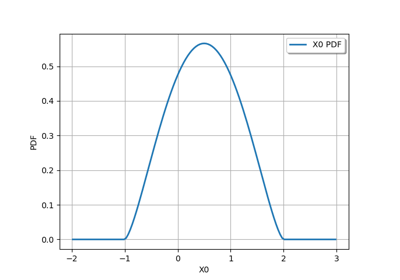BetaMuSigma¶
- class BetaMuSigma(*args)¶
Beta distribution parameters.
- Parameters:
- mufloat
Mean.
Default value is 0.5.
- sigmafloat
Standard deviation
.
Default value is 0.223607.
- afloat
Lower bound.
Default value is 0.0.
- bfloat,
Upper bound.
Default value is 1.0.
Methods
evaluate()Compute native parameters values.
Accessor to the object's name.
Get the description of the parameters.
Build a distribution based on a set of native parameters.
getName()Accessor to the object's name.
Accessor to the parameters values.
gradient()Get the gradient.
hasName()Test if the object is named.
inverse(inP)Convert to native parameters.
Test whether the Beta distribution is elliptical.
setName(name)Accessor to the object's name.
setValues(values)Accessor to the parameters values.
See also
Notes
The native parameters
are defined as follows:
Examples
Create the parameters
of the Beta distribution:
>>> import openturns as ot >>> parameters = ot.BetaMuSigma(0.2, 0.6, -1, 2)
Convert parameters into the native parameters
:
>>> print(parameters.evaluate()) [2,3,-1,2]
- __init__(*args)¶
- getClassName()¶
Accessor to the object’s name.
- Returns:
- class_namestr
The object class name (object.__class__.__name__).
- getDescription()¶
Get the description of the parameters.
- Returns:
- collection
Description List of parameters names.
- collection
- getDistribution()¶
Build a distribution based on a set of native parameters.
- Returns:
- distribution
Distribution Distribution built with the native parameters.
- distribution
- getName()¶
Accessor to the object’s name.
- Returns:
- namestr
The name of the object.
- gradient()¶
Get the gradient.
- Returns:
- gradient
Matrix The gradient of the transformation of the native parameters into the new parameters.
- gradient
Notes
If we note
the native parameters and
the new ones, then the gradient matrix is
.
- hasName()¶
Test if the object is named.
- Returns:
- hasNamebool
True if the name is not empty.
- inverse(inP)¶
Convert to native parameters.
- Parameters:
- inPsequence of float
The non-native parameters.
- Returns:
- outP
Point The native parameters.
- outP
- isElliptical()¶
Test whether the Beta distribution is elliptical.
- Returns:
- testbool
Answer.
Notes
The Beta distribution parametrized by the given
is elliptical if
.
- setName(name)¶
Accessor to the object’s name.
- Parameters:
- namestr
The name of the object.
- setValues(values)¶
Accessor to the parameters values.
- Parameters:
- valuessequence of float
List of parameters values.
 OpenTURNS
OpenTURNS
